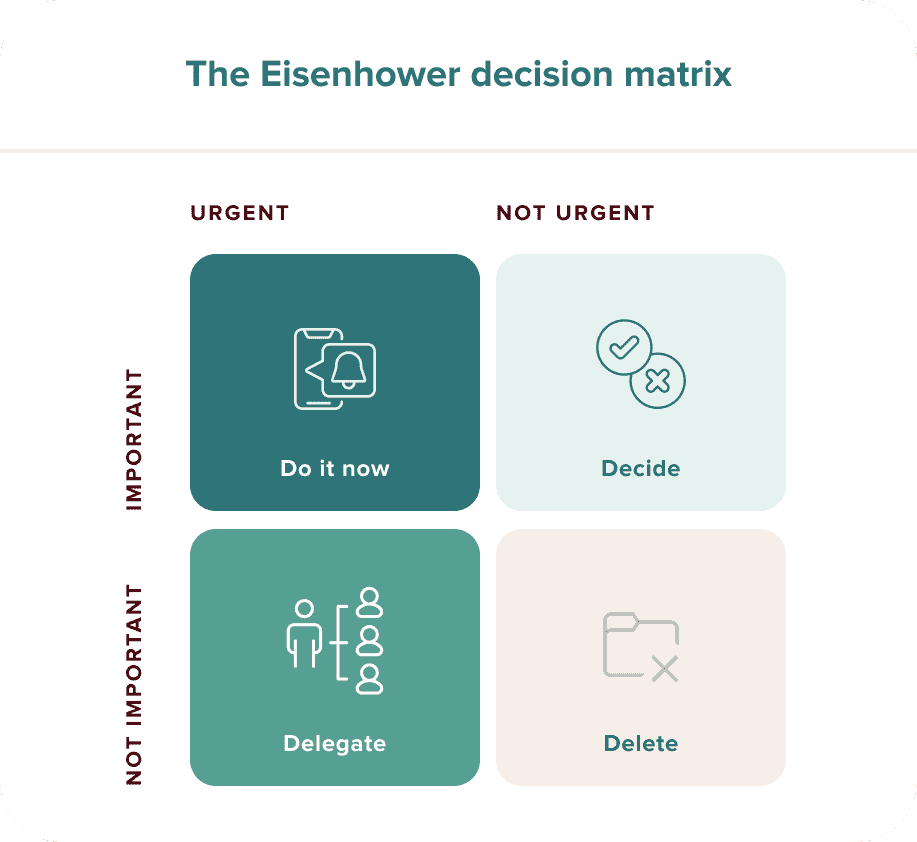
How to organize your time so that you can finally breathe
Do you fall on the pillow in the evening without energy and with the feeling that you still can’t keep up? Have you and your friends been trying to meet for dinner for a month? We all have difficult times sometimes, but don’t let yourself be overwhelmed by responsibilities and burnout. We will help you navigate the chaos and guide you through practical steps to organize your time and properly plan your day. So that you can breathe easy in the evening and take care of yourself.
How to get out of the cycle of not chasing and organize your time
If you are drowning in tasks, first you will need to untangle yourself from the whole situation – get an overview of everything that is happening, get it out of your head and solve the basic organization of time. You will see that you will feel a little relief right away. We’re going to do it in four steps.
1. Map out all tasks and responsibilities
Start with the work and study ones. Write down all the tasks that lie on your desk, all the projects that await you, and also regular activities. This could be writing monthly reports, regular meetings, etc. You need to get the best possible overview.
Do the same with personal tasks. Write down your current obligations, from making an appointment with the dentist to buying a present for an upcoming birthday. Everything you carry in your head. If you regularly have more demanding household tasks (like mowing the garden), put them on paper too.
2. Set your priorities
You might be shocked by how many appear on the list. But don’t worry, we will reduce it gradually.
We often feel overwhelmed because we are not focusing on what is really important. When the deadline approaches, stress comes. That’s why we have to prioritize tasks. A great tool is the Eisenhower Principle. According to him, you divide tasks into four categories based on their importance and urgency.
Can’t decide what’s important? Try using the Pareto principle. According to him, 20% of the effort (in time management) brings us 80% of the benefit (income). Look for activities that have the biggest impact on your bottom line.

3. Delete, delegate, or ask for help
Then comes the time to get rid of unimportant tasks. Either by delegating them or simply not doing them. You really don’t have to do everything yourself. You can delegate the work to someone on the team, hire an outsider, or go to your supervisor with your to-do list and ask them to prioritize together.
Before you get out of the worst, how about inviting the lady for a proper cleaning or solving the arranged Sunday lunch by inviting the family to a restaurant? You will definitely come up with a lot of tasks that you don’t have to do yourself. It’s worth the peace of mind.
4. Break larger tasks into smaller pieces
You know that feeling when you have a big task in front of you, but you keep putting it off because you don’t really know where to start?
That is why it is necessary to break down all large tasks (projects) into the smallest possible parts. Ones that only take a few minutes. For example, you can divide the preparation of the presentation into researching information, preparing the outline, creating slides, improving the design, etc. You don’t have to do everything at once. When you have the tasks divided, you can move them forward step by step, even if you only have fifteen minutes left for them.

How to plan your day to get the most done
You already know what awaits you. The next step is to plan the tasks correctly. Use a diary or one of the time management applications, it is not good to carry tasks in your head. You will be relieved.
Plan at least every week, maybe even a month. It doesn’t happen then that you promise something when you have a deadline for a monthly report, for example. Here we go:
- First, write down all regularly recurring tasks on specific days. At least for a month ahead.
- Set yourself only one challenging task each day. That way you won’t feel overwhelmed and you’ll concentrate better.
- Add a few smaller, less challenging tasks each day. Try grouping similar tasks together. If you tune in to one type of work, you’ll do better offhand. You can divide them, for example, into analytical and creative.
- Set a time limit for each task. One that you can actually fulfill. This will help you stick to a plan and not jump from one task to another.
- Don’t fill your daily schedule to the brim. Always leave time for unexpected situations.
- Expect regular breaks as well. Spending a few minutes stretching, taking a short walk or meditating will pay you back many times over.
Find out where your time is running out
Often we don’t even realize it, but during the day we run away to non-essential activities. For most of us, social media is a major time waster. But it can also be unnecessary meetings or any other form of procrastination. Try recording all your activities for a few days and see where you could “win” extra time. You will then have more free time in the evening and you can finally meet up with friends or finish reading the book that is lying on your desk.

Time-management methods that boost productivity
We have a schedule, so now we’re going to look at specific time management methods to help stick to the schedule.
- Do the most important task of the day first (eat the frog first) – we can concentrate better in the morning. Having the most important task done by lunchtime will keep you in a more positive mood for the rest of the day and work will flow more easily.
- Give yourself deadlines – even for tasks that do not have a clear deadline. This will create a sense of urgency and help you focus and stay motivated.
- Try the pomodoro technique – this means working with concentration for 25 minutes straight and then taking a 5-minute break. It will help you not run away from work.
- Instead of multi-tasking, do single-tasking – studies have shown that multi-tasking causes stress to the brain and reduces the quality of our work. Therefore, close all unnecessary windows in the browser and focus on only one activity at a time.
- Set aside a few hours for concentrated work – challenging tasks will then be easier for you. Find a quiet corner, turn off all notifications and devote a few hours to deep work. Then take a break and feel free to reward yourself somehow.
- Set boundaries – this means, for example, saying “NO” when “YES” would mean going against ourselves. Or not to put too much on yourself just to relieve or accommodate others. That too is time-management.
It may not seem like it now, but there is always a way out. But don’t be too hard on yourself. It takes time to get used to structured work and to train discipline. Start gradually and celebrate each progress.
Time management, work-life balance and procrastination are also great topics for therapy. No problem is “minor”. An expert will help you sort out your thoughts, set priorities, find motivation and, above all, a way out of the chaos. In Hedepy, we offer therapy online and you can choose from more than a hundred certified therapists.
Have a look at how it works.
Don’t face it alone
Finally, we would like to tell you the last and most important thing. It is completely natural to experience a wave of emotions in a difficult situation. Every crisis has its beginning, but it also has its end. Yours too. Therefore, if you are at least considering it even a tiny bit, ask for the help of a psychologist, psychiatrist, psychotherapist, or coach. Don’t face it alone; you can find help – At Hedepy.cz, there are more than 30 therapists. You can choose someone who is best suited to your needs, and make an appointment for the next day. You can then connect with the therapist online, from the comfort of your own home.Thinking about therapy?

My First Therapy: How to Prepare and What to Expect

What is psychotherapy? And who is it for?


